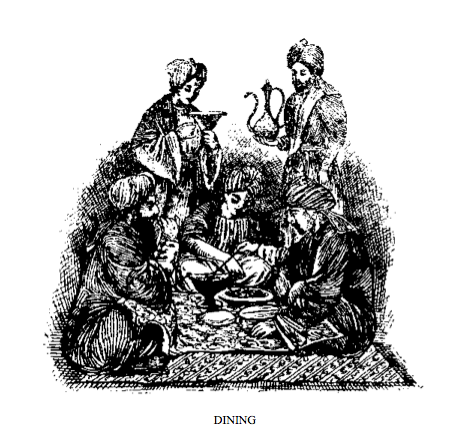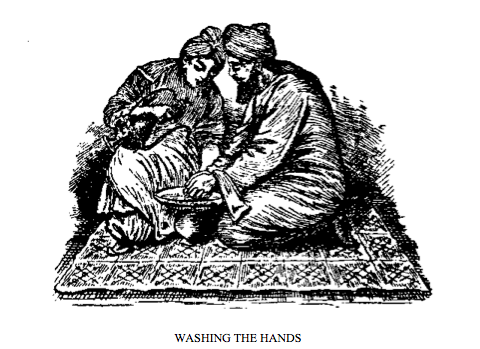“The Devil has power over that food which is eaten without remembering God.”
“Repeat the name of God. Eat with the right hand and eat from before you.”
“When a man comes into a house at mealtime, and remembers the name of God, the devil says to his followers, ‘There is no place here for you and me to-night, nor is there any supper for us.”
“When anyone eats he must not wash his fingers until he has first licked the.”
“Whoever eats a dish and licks it afterwards, the dish intercedes with God for him.”
“When victuals are placed before you, eat them with your shoes off, because taking off your shoes will ease your feet.” (‘Abda il-Haqq adds, “and do it out of respect to the food.”)
“Whoever eats from a plate and licks it afterwards, the dish says to him, ‘May God free you from hell as you have freed me from the devils licking me.'”
Qatadah says that Anas said: “The Prophet did not eat off a table, as si the manner of proud men, who do it to avoid bending their backs.” (Mishkat, Arabic ed. Babu ‘l-Al’imah.)
The following directions are given for eating, by Faqir Muhammad, As’ad, the author of the Akhlaq-I-Jalali. (Thompson’s English Translation, p 234): –
“First of all, he should wash his hands,
mouth, and nose. Before beginning he should say, ‘In the name of God (Bisillah); and after ending he must say ‘Glory to God’ (Al-hamdu lillah). He is not to be in a hurry to begin, unless he is the master of the feast; he must not dirty his hands, or clothes, or the table linen; he must not eat with more than three fingers, nor open his mouth wide; not take large mouthfuls, nor yet keep them too long unswallowed. He must not suck his fingers in the course of the eating; but after he has eaten, he may, or rather ought, as there is scripture warrant for it.
“Let him not look from dish to dish, nor smell the food, nor pick and choose it. If there should be one dish better than the rest, let him not be greedy on his own account, but let him offer it to others. He must not spill the grease upon his fingers, or so as to wet his bread and salt. He must not eye his comrades in the midst of mouthfuls. Let him eat from what is next him, unless of fruit, which it is allowable to eat from every quarter. What he has once put into his mouth, such as bones &c), he must nor replace upon his bread, nor upon the table-cloth; if a bone has found its way there, let him remove it unseen. Let his beware of revolting gestures, and of letting anything drop from his mouth into the cup. Let him so behave, that, if anyone should wish to ear the relics of his repast, there may be nothing to revolt him.
“Where he is [a guest, he must stay his hand sooner than the master of the feast; and whenever the rest discontinue eating, he must act in concert with them, except he be in his own house, or some other where hi constitutes part of the family. Where he is himself the host, he must not continue eating when the rest have stayed their hands who chances to fancy it.
“If he has occasion to drink in the course of his meal, let him do it softly, that no noise in his throat of mouth may be audible to others. He must not pick his teeth in the view of the company, nor swallow what his tongue may extract from between them; and so of what may be extracted by the toothpick, let him throw it aside so as to disgust no one. “When the time comes for washing his hands, let him be exceedingly careful in cleansing his nails and fingers. Similar must be his particularity in washing his lips, mouth, and nostrils. He must not void his rheum into the basin; even the water in which his mouth has been rinsed, let him cover with his hand as he throws it away.”
“Neither must he take the turn from others in washing his hands, saving when he is master of the entertainment, and then he should be the first to wash.”
Based on Hughes, Dictionary of Islam



 © 2025 All Rights Reserved
© 2025 All Rights Reserved